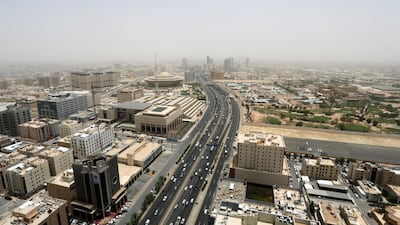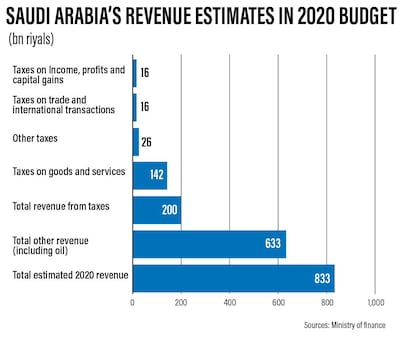Saudi Arabia, the world’s biggest oil exporter, like many other nations, is looking for ways to tighten its belt and increase revenues to soften the impact of a coronavirus-inflicted economic slowdown.
The country on Monday said it was cutting back on expenditures, suspending state allowances and increasing the value added tax three-fold, as it tries to shore up its finances at a time of lower oil prices.
Before the Covid-19 outbreak, Saudi Arabia was on the road to diversifying its economy following the three-year oil price slump that began in the middle of 2014. Its non-oil revenue base has expanded over the past few years, with the introduction of VAT, expatriate levies and excise taxes on tobacco and sugary drinks. However, the sale of hydrocarbons still accounts for a major chunk of its revenues.
The National takes a look at what were the kingdom's pre-coronavirus oil and non-oil revenue expectations for 2020.
Non-oil revenue
Saudi Arabia’s non-oil revenue largely consists of taxes and duties which range from customs fees on international trade transactions to consumption taxes and the levies expats pay to sponsor their families in the kingdom. Saudi Arabia expected to generate 200 billion riyals (Dh195.8bn) in total from all taxes this year, according to the kingdom’s 1.02 trillion riyal 2020 budget document released in January.
Taxes on income, profits and capital gains
Revenue from taxes levied on income, profits and capital gains this year were expected to rise more than 2 per cent to reach 16bn riyals at the end of the financial year.
Taxes on goods and services
Revenue from consumption taxes, which include duties on tobacco and sugary drinks, were expected to rise to 142bn riyals this year, slightly higher than the previous year. This figure is also likely to rise substantially because of the three-fold increase in VAT from July.
Other taxes
Revenue from other taxes including zakat, an Islamic tax on assets, are expected to come in at 26bn riyals at the end of the current financial year.
Taxes on trade and international transactions
Taxes on trade and international transactions, mainly custom duties, are expected to generate 16bn riyals.
Other revenue
Other revenue, including proceeds from the sale of hydrocarbons, was expected to reach 633bn riyals this year, according to January's budget document.
Oil revenue
Proceeds from oil were projected to come in at 513bn riyals. However, oil prices have declined more than 60 per cent this year from their peak in January and as a leading member of the Organisation of Petroleum Exporting Countries, Saudi Arabia has also agreed to higher production curbs on a staggered basis until 2022. Members of Opec and allies, including Russia, agreed to curb production by a combined 9.7 million barrels per day, starting this month. Saudi Arabia agreed to cap production at 8.5 million bpd, which is 3.8 million bpd lower than the kingdom's 12.3 million bpd output planned for April.



